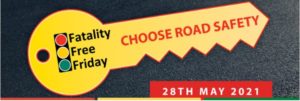Cootamundra-Gundagai Regional Council (CGRC) is urging all residents to consider the devastating domino effect of road trauma, as Australians continue to undertake risky behaviours on the roads.
New research released by the Australian Road Safety Foundation (ARSF) in the lead up to the 15th annual Fatality Free Friday initiative (28 May) found speeding remains by far the highest broken road rule, with 78 per cent of Australians admitting to being heavy footed.
Surprisingly, females are more likely than their male counterparts to speed, with an alarming 81 per cent of female drivers admitting to the risky behaviour.
The findings also reveal that jaywalking is the second highest road law broken, which shows that it’s not just Australian drivers but also pedestrians who need to step up their road safety skills.
Worryingly, more than two thirds of Australians admit to having broken a road rule, with a quarter of people doing so at least once a week.
When it came to the reasons for undertaking these potentially life-threatening behaviours, half of Australian drivers said it was due to inattention (50%), followed by the belief that it was safe to do so (30%).
ARSF founder and CEO Russell White said the research highlights the need for further education around the idea that it’s just drivers who suffer the consequences of road risk taking.
“Tragically, 1,108 people lost their lives on Australian roads last year. The research shows that a frightening 84 per cent of road users falsely believe that drivers make up the majority of the road toll, when in actual fact more than half are passengers, pedestrians, cyclists and motorcyclists,” Mr White said.
“Individuals have a responsibility to make the right choices when using the roads and it is imperative, they understand the devastating consequences their choices can have not just on other road users, but on the wider community.
“That’s why this year we’re working to increase awareness of the devastating domino effect of road trauma beyond fatalities. The impact of road trauma is far-reaching and does not discriminate. Road users also need to understand the impact on families, friends, schools, workplaces, first responders and emergency services.”
As a powerful reminder of the devastating domino effect that road trauma creates, ARSF has partnered with renowned Brisbane artist Ben Craig to design an engaging installation made from thousands of dominoes.
Fortunately, the ARSF is not alone in understanding the importance of education and changes to behaviour, with almost half the population agreeing that this is the best way to prevent road trauma.
The research also reveals we can expect to see far more activity on our roads post-Covid, with one in two Australians more likely to go on long road trips rather than flying this year.
The research has been released as the ARSF calls on individuals to #ChooseRoadSafety and demonstrate their commitment to reducing the road toll by taking the Fatality Free Friday pledge.
Taking the pledge means promising to always be fit to drive, stay focused on the road, scan the road ahead, keep a safe distance, and to drive in a way that suits the conditions.
Since its inception in 2007, Fatality Free Friday has grown to become Australia’s largest national community based road safety program.
CGRC mayor Cr Abb McAlister highlighted the initiative with a message to all motorists and residents.
“This is a fantastic initiative, anything that makes us stop and think about road safety, how we drive, and how our actions behind the wheel have implications on others is a great thing. Taking the pledge is giving a commitment to think, stay focussed and drive with others in mind,” Cr McAlister said.
While the target is to have zero fatalities on Australian roads on Friday 28 May, the initiative is much more than just a single day, ultimately aiming for long-term community change.
To take the pledge, visit https://arsf.com.au/take-the-pledge/.
|
About ARSF: The Australian Road Safety Foundation is a not for profit organisation dedicated to improving road safety awareness, enhancing driver education and reducing the impact of road trauma. The Foundation strives to improve road safety outcomes, develop research and education programs and work to inform policy makers on methods to address road safety issues. It also provides an umbrella organisation for other road safety programs and community groups. ARSF is helping to develop a sustainable strategy for reducing the social and economic costs of road crashes, as well as providing a platform for future research and advocacy programs. |
-END-


